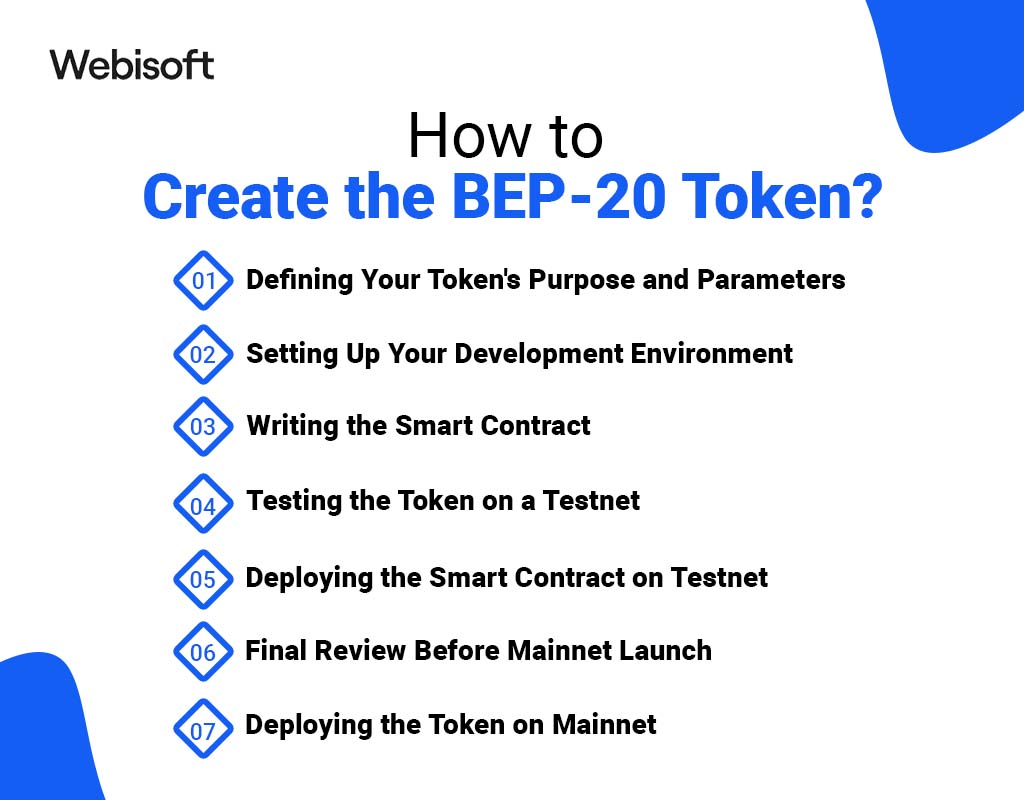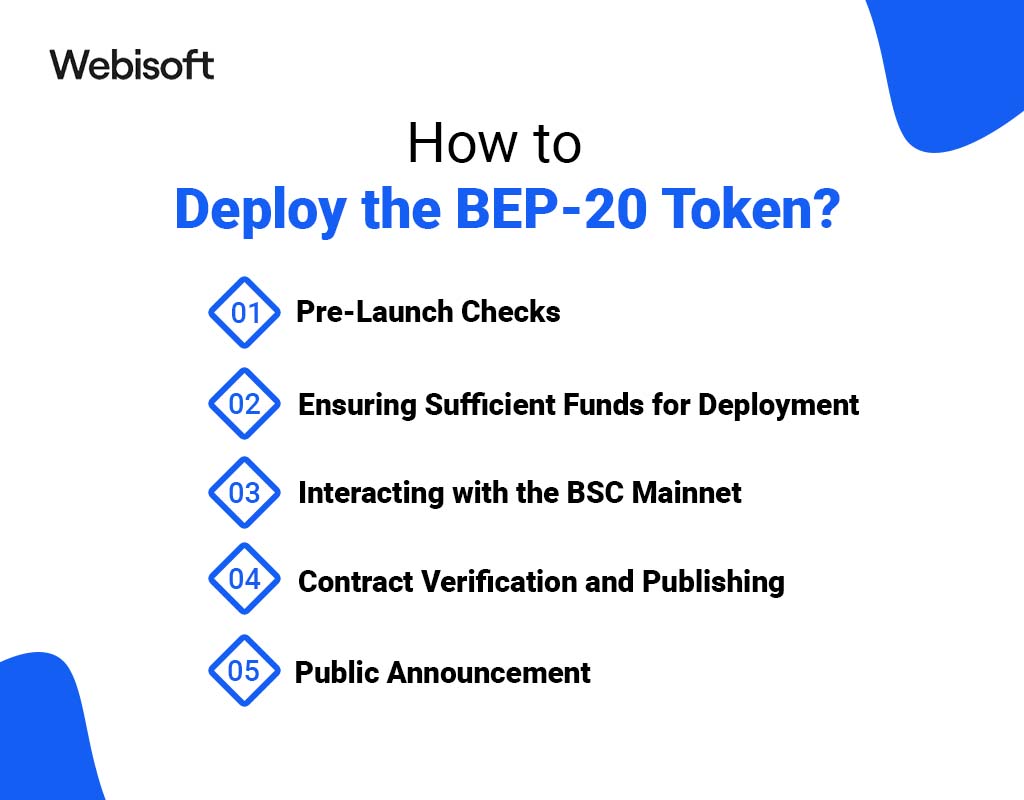Creating a BEP20 token is a significant stride in the evolving world of cryptocurrencies. The Binance Smart Chain (BSC) hosts over 1.1 million unique smart contracts, a testament to its growing popularity.
This blockchain platform stands out due to its compatibility with Ethereum’s well-established ecosystem and its lower transaction costs, which often amount to mere cents.
For innovators and developers, creating a BEP-20 token opens doors to many opportunities, from fundraising and decentralized finance to creating utility for new services.
Understanding the technical and strategic aspects of token creation is crucial, as a well-crafted token can become the backbone of a new, decentralized digital economy.
In this guide, we will discover all the details about how to create a BEP-20 token. So, let’s start jumping into the main discussion!
Contents
What is Binance Smart Chain?

Binance Smart Chain (BSC) stands out in the blockchain world. It runs parallel to Binance Chain. BSC isn’t just a clone of its predecessor; it adds smart contract functionality and compatibility with Ethereum Virtual Machine (EVM).
The design goal for BSC was to keep the high throughput of Binance Chain while introducing smart contracts into its ecosystem. Transactions on BSC happen fast and with lower fees, a big plus for users and developers.
The chain employs a consensus model known as Proof of Staked Authority (PoSA). This combines elements of Proof of Authority (PoA) with staking capabilities from Delegated Proof of Stake (DPoS). The result? A high-performance, decentralized, and flexible blockchain.
What is the BEP-20 Token Standard?

The BEP-20 standard is a big deal in the Binance Smart Chain ecosystem. It defines a set of rules for tokens on BSC, similar to Ethereum’s famous ERC-20 standard.
Tokens following the BEP-20 standard are like digital passports. They ensure compatibility with other products and services on the BSC network.
Creating a token that follows BEP-20 is a straightforward process, opening up a world of possibilities for developers and projects. BEP20 token Binance can represent anything from a physical object to a service or even a share in a project.
The standard ensures that this diverse range of tokens can work smoothly within the Binance Smart Chain environment. The Binance Smart Chain and the BEP-20 token standard are cornerstones of the BSC ecosystem.
They work together to create a vibrant and bustling network where developers can build innovative applications and users can enjoy a smooth, cost-effective experience.
How to Create the BEP-20 Token?

The steps to create a BEP-20 token are:
Defining Your Token’s Purpose and Parameters
You begin by conceptualizing your token. What will it represent? Will it be a utility token, a governance token, or something else? Determine its name, symbol, and total supply. These are not just technical details but also part of your token’s identity and how it will be perceived in the market.
Setting Up Your Development Environment
For creating a token, you’ll need a development environment. Install and configure MetaMask or another wallet that supports Binance Smart Chain. Acquire BNB, used to pay transaction fees on the BSC network. This preparation is crucial to interact with the blockchain.
Writing the Smart Contract
The next step is to write and create the smart contract code. The code will define the behavior of your token. If you’re unfamiliar with coding, you might use a template or hire a developer.
The smart contract must follow the BEP-20 standard and include all the necessary functions like transferring tokens, approving spending by third parties, etc.
Testing the Token on a Testnet
Testing is a critical step. Deploy your token to the BSC test net, an exact replica of the main net but uses test BNB that’s free and has no real value. This allows you to simulate transactions and interactions to ensure everything works as expected without risking real assets.
Deploying the Smart Contract on Testnet
Using an Integrated Development Environment (IDE) like Remix, deploy your token’s smart contract on the test net. This step requires you to interact with the blockchain, and you may encounter errors or issues that need fixing.
Final Review Before Mainnet Launch
Assuming the testnet deployment is successful, you’ll review the smart contract one last time. It’s vital to ensure everything is correct because, after deployment on the mainnet, the code can’t be altered.
Deploying the Token on Mainnet
Finally, deploy your token on the Binance Smart Chain mainnet through Remix, connecting your wallet and paying the deployment fee. This makes your token official and usable.
Create Your Own BEP-20 Token Today!
Launch your token on Binance Smart Chain with expert guidance.
How to Deploy the BEP-20 Token?

This entire process requires a sound understanding of blockchain technology and careful planning. As mentioned, legal consultation is also advised to ensure your token complies with regulations.
Pre-Launch Checks
Before deployment, ensure that your smart contract is thoroughly tested and audited. A successful deployment requires that the smart contract is free from vulnerabilities and bugs.
Ensuring Sufficient Funds for Deployment
Ensure your wallet has enough BNB to cover the gas fees associated with deploying a contract on the BSC network. Gas fees can fluctuate, so have a buffer over the estimated amount.
Interacting with the BSC Mainnet
Access a blockchain IDE like Remix. It allows you to interact with the Binance Smart Chain. Here, you will compile your smart contract code.
Actual Deployment In the IDE, compile your smart contract and then deploy it on the BSC mainnet. This step will require you to confirm the transaction in your wallet and will consume gas.
Contract Verification and Publishing
After deployment, verify and publish your smart contract on BscScan. This process involves uploading your contract source code and is important for transparency and credibility.
Public Announcement
Once your token is live, it’s important to announce its launch to potential users, investors, and the wider community, often through social media, press releases, and community forums.
Final Note
Creating a BEP-20 token on the Binance Smart Chain is a milestone for many projects aiming to leverage blockchain technology for utility, governance, or as a means of exchange. With its cost-efficiency and high performance, the process is both accessible and practical for a variety of applications.
Did you find this information insightful? Are you considering harnessing the potential of BEP-20 tokens for your project? We’d love to hear your thoughts and plans!
If you’re ready to take the next step and create your own BEP-20 token, Webisoft will guide you through the process. Reach out to our blockchain experts, and let’s make your blockchain project successful.
Frequently Asked Questions
Is it possible to create a BEP-20 token for free?
You can develop and test your token on the BSC testnet for free, but deploying it to the mainnet will require gas fees.
Can a BEP-20 token be traded on exchanges?
Yes, once created, a BEP-20 token can be listed and traded on various exchanges that support the Binance Smart Chain.
How long does it take to create a BEP-20 token?
The creation process can take just a few minutes. However, planning and developing a meaningful project around the token takes much longer.
Can I set a total supply limit on my BEP-20 token?
Yes, you can define the total supply within your smart contract upon the creation of the token.
What are the common uses of BEP-20 tokens?
BEP-20 tokens can be used for various applications. It includes decentralized finance (DeFi) projects, non-fungible tokens (NFTs), and digital currencies for specific ecosystems.


